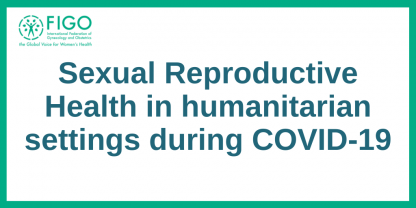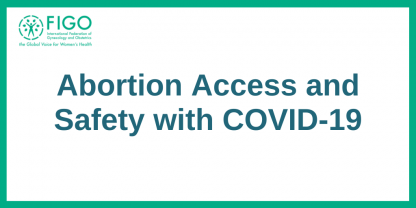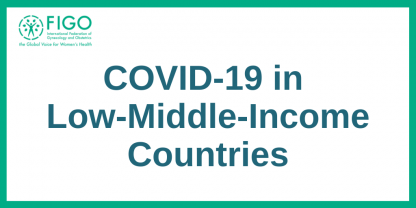COVID-19 lockdowns leading to a rise in violence against women and girls
The global COVID-19 pandemic in its indiscriminate spread has claimed loved ones before their time - once bustling cities and neighbourhoods now stand in ‘lock-down’.

While the spread of COVID-19 is indiscriminate, mounting evidence has revealed that COVID-19 has further compounded existing inequalities putting already marginalised women and girls, often with weaker access to political and economic power, at greater risk, not only to the coronavirus but also to the direct and indirect consequences of lock-down.
FIGO and our 132 National Member Societies commitment to promote women’s health and rights precedes the COVID-19 pandemic, yet the two are explicably linked. UN Women has reported a global rise in domestic violence cases and new evidence released by UNFPA reveals that for every 3 months the lockdown continues an additional 15 million cases of gender-based violence are expected, 13 million women will not be able to access modern contraceptives and there will be an estimate of 325,000 unintended pregnancies.
These figures make for a harrowing read and are further compounded by the fact that progress towards the Goal 3 of the 2030 Agenda for Sustainable Development (SDGs) which includes reducing maternal deaths globally is lagging far behind its set target, and that was an update prior to the onset of the COVID-19 pandemic.
Globally an estimated 303,000 women died due to complications of pregnancy and childbirth in 2015, and unsafe abortions account for 13% of global maternal deaths. Almost all of these deaths were preventable and occurred in low-and middle-income countries.
A rise in violence against women and girls has a direct link to unwanted pregnancies which increases risks to maternal death, if access to safe abortion is not available. That is why, more than ever, FIGO’s project advocating for safe abortion is now even more relevant and has a key role to play in ensuring that safe abortion services are offered to the full extent of the law in each country.
Prof Robert J. I Leke, President of the Society of Gynaecologists and Obstetricians of Cameroon (SOGOC) shares:
"The pandemic is likely to increase domestic violence and sexual violence leading to rape and unwanted pregnancies and an increase in abortion rate subsequently, [and] our abortion laws are still restrictive in Cameroon."
In addition, Dr Mwansa Lubeya, OBGYN, Zambia, shared concerns regarding enforcing lockdown measures, that may result in abuses of power (as recently reported in Rwanda).
"Law enforcers may rape young women during times of lock down and reduced crowding, that is when women are caught and raped as a punishment which may lead to unwanted pregnancies.’’
Dr Lubeya highlights that due to the COVID-19 pandemic:
‘Medical doctors and other health practitioners have shifted to the COVID-19 fight and comprehensive safe abortion may not be viewed as an emergency even when it is."
Dr Musonda Makasa, OBGYN, University Teaching Hospital, Zambia adds:
"Access is critical in order to avoid backyard abortion and the poor health sequelae that is associated with it. The Ministry [of Health] can guide on how hospitals can redesign patient flow and triaging without disadvantaging other conditions."
In Latin America, countries have also entered lock-downs and governments such as Panama and Peru have also employed a gendered lock-down policy, which has also resulted in allegations of mistreatment by the transgender community.
Dr. Ruth De León, OBGYN, Head of Research at the Department of Sexual and Reproductive Health at the Gorgas Memorial Institute for Health Studies, Panama outlines:
"Panama today lives a total and mandatory quarantine, which only allows maximum circulation two hours a day for three days a week, according to gender and last number of the personal identity document. Monday, Wednesday and Friday women can mobilise; while Tuesday, Thursday and Saturday, men. Sunday is a day of absolute immobility."
Similar to Cameroon and Zambia, abortion in Panama is governed by a restrictive legal framework, concerning access to abortion in rape. It is necessary that the crime be reported to the competent authority and that the abortion be practiced within the first two months of pregnancy - 8 weeks.
The main challenge is that the COVID-19 pandemic should not affect due process that would allow women to access a legal and safe abortion, such as those linked to the necessary jurisprudence to verify and certify a case of sexual violence and the approval of therapeutic abortion cases.
Dr De León adds:
"The Ministry of Health should ensure that processes intended to make accessible legal and safe abortion services in the country, are unaffected by the new rules/measures set out to address the COVID-19 pandemic. They must guarantee that there are spaces to carry out the medical procedures stipulated for the care of abortion cases."
Meanwhile, Dr De León’s OBGYN member society – Panamanian Society of Gynaecology and Obstetrics (SPOG) is taking action to ensure that the related impact of COVID-19 lockdowns on women and girls are highlighted and addressed:
‘Communications have been created that link the environment of the pandemic with the risks of domestic and sexual violence and how to proceed - considering that this is the main cause of clandestine abortion, with attention to the warning signs of obstetric urgency. These communications have been shared through our social networks. We aim to reduce maternal mortality caused by unsafe abortions.’
An estimate of 25 million unsafe abortions are conducted per year, with 97% taking place low-income countries. The World Health Organisation has stated that access to safe abortion is an essential time-sensitive health care, but still, as of 2017, 42% of women of reproductive age live in the 125 countries where abortion is highly restricted (prohibited altogether, or allowed only to save a woman/girl’s life or protect her health).
Many OBGYNs and health workers have raised that a lack of clarity as to when an abortion can be performed e.g. what is exactly meant by the words ‘save a woman/girls life or health’ leaves a dangerous vacuum. The lack of clarity in abortion laws is also further reinforced by the absence of national abortion guidelines, which creates and sustains a hostile environment for OBGYNs - where they constantly fear reprisals and imprisonment if they perform a safe abortion. Hostile environments nurture stigmatisation and silencing of women and girls who seek a safe abortion, which increases their risk to an unsafe abortion and maternal death.
As the COVID-19 pandemic escalates it is critical that more governments urgently invest in resources and services to protect women and girls’ right to live free from violence.
In addition, women and girls’ reproductive health care must be prioritised, which includes ensuring access to contraception and implementing measures such as telemedicine to deliver safe abortion. Such services are already in place in some countries e.g. Australia prior to COVID-19, and were recently adopted by countries such as England, Ireland and Scotland, providing a much-needed solution to avoiding unsafe abortions and maternal deaths.


